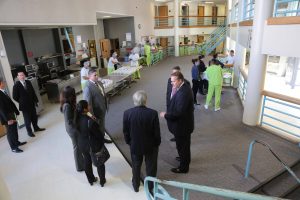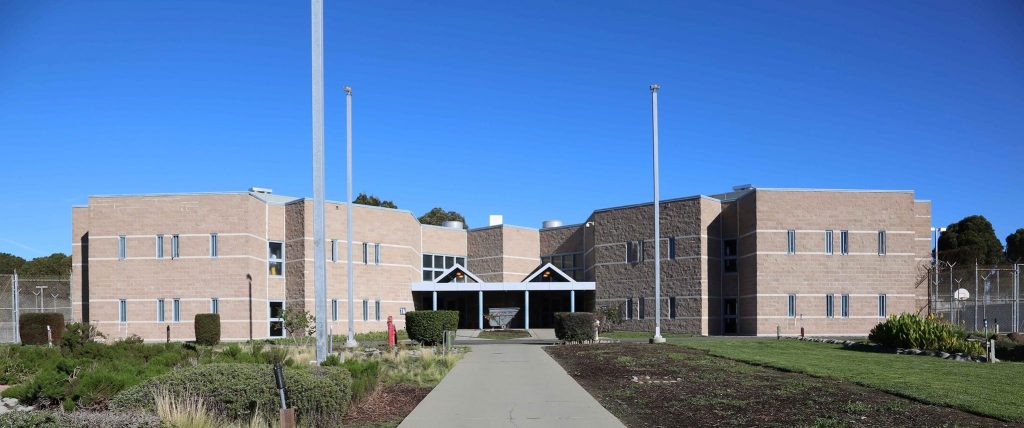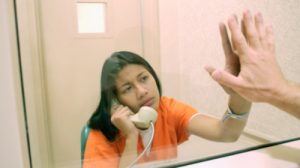Group claims “retaliation for public criticism of detention conditions” at West County Detention Facility.
During an investigation by the Contra Costa County Office of the Sheriff, it was discovered the San Francisco-based Community Initiatives for Visiting Immigrants in Confinement (CIVIC) volunteers repeatedly violated rules at the West County Detention Facility (WCDF) in Richmond, by providing their personal phone numbers and addresses to incarcerated persons; relaying messages to family and friends of incarcerated persons; receiving phone calls and mail from incarcerated persons; sending contraband to incarcerated persons; and depositing money into the accounts of incarcerated persons.
According to the organization’s website, “CIVIC is devoted to abolishing U.S. immigration detention, while ending the isolation of people currently suffering in this profit-driven system.”
The investigation found approximately 20 CIVIC volunteers repeatedly violated the rules for an extended period.
On March 5, 2018, CIVIC’s clearance was revoked, but like other groups that lose their clearance, they can appeal. CIVIC has not invoked its right to appeal. Access for other some other organizations is currently being reviewed for possible violations.
“The Contra Costa County Office of the Sheriff welcomes and partners with numerous community-based organizations and non-governmental groups to assist incarcerated person with their rehabilitation and re-entry back to their communities when they are released,” said Assistant Sheriff Matt Schuler. “While CIVIC’s clearance was revoked, we continue to partner with numerous community and volunteer groups that provide needed services and resources to incarcerated persons.”
There are currently over 20 programs available to the incarcerated population at West County Detention Facility. Many of the programs are run by volunteers from community-based organizations.
All volunteer groups that interact with the Office of the Sheriff incarcerated population and/or Federal Immigration and Customs Enforcement (ICE) detainees must agree to the rules set forth in the Detention Facility Clearance Request. These cover: Harassment and Discrimination, Treatment of Offenders and Non-Fraternization, Code of Conduct/Ethics/Confidentiality Agreement and Custody Services Bureau Guidelines for Volunteers. Specific rules for volunteers include: must not engage in undue familiarity with inmates or family and friends of in-mates; must not contact or correspond with an inmate or their family; must not take or send messages or items on behalf of an inmate; and must not trade, barter, lend or engage in any personal transactions with any inmate.
Every volunteer must take a class that covers the guidelines and safety for civilians in the detention facility. They also sign an agreement and are warned that clearance will be revoked if they violate any of the rules.
CIVIC Denies Violations, Seeks Reinstatement
However, CIVIC – a nationwide network working to end the isolation and abuse of people in ICE detention through visitation, monitoring, and other types of support – denies the violations occurred and is calling on ICE and the Contra Costa County Sheriff’s Office to reinstate their community visitation program and free hotline at the WCDF.
“None of these actions are in violation of the facility’s policies which all CIVIC volunteers are forced to sign if they want to visit someone in ICE detention,” said Christina Fialho, an attorney and the co-founder/executive director of CIVIC. “In terminating our program, the Sheriff’s Department and ICE are not just trying to punish us, they are trying to send a message to other activists to stay silent. We will not be silenced.”
Since 2011, CIVIC has operated a visitation program and free hotline for people in ICE detention at WCDF. Last November, CIVIC published a letter from 27 women detained at WCDF that recorded abuses at the facility, including being frequently locked up for hours and being forced to use bags in their cells when they needed to use the toilet. (See related article.)
“I am very grateful to CIVIC because they were of great help and support to my immigration case. It was hell where I was detained. They kept us in a precarious situation,” expressed Nancy Mayer Mejia, who was detained for five months at WCDF and penned the letter that 26 other women then signed onto. “Thanks to the people of CIVIC, I believed in myself again. They brought hope into my life during every visit.”

Sheriff David Livingston, center, speaks with Congressman Mark DeSaulnier (to his left) and staff during a tour of the West County Detention Facility in Richmond on Monday, Nov. 27, 2017. Herald file photo.
Since November, CIVIC has continued to speak out in newspapers, on the radio, in community meetings, and at peaceful protests outside the facility. The letter from the women in detention led to calls for investigations from local representatives, including U.S. Rep. Mark DeSaulnier, who called for a federal probe into the matter.
A Sheriff’s Department investigation found that nearly all of the complaints were unfounded and unsubstantiated. Claims of being “locked down” for 23 hours a day were found to be false. The most time any ICE detainee was confined to their dormitory room was one hour and 24 minutes. The “lock downs” are commonly done for facility counts or for administrative reasons. At WCDF the detainees have keys to their rooms and free use of common bathroom facilities.
In one example, the person who complained in the article of being confined to her room for 23 hours was in fact confined for several days in a room with a full toilet and sink. She was confined in such a manner for disciplinary purposes after she assaulted another detainee.
Regarding the use of “red” biohazard bags for toilet needs, there was no evidence that any detainee was forced to use the bags in that manner. In very few cases detainees did use the bags for that purpose in violation of policy. Biohazard bag distribution is now limited to those detainees who are ill or have other medical needs. All inmates are free to use the bathrooms at any time, and even during “lock down” periods of approximately one hour, by notifying a Deputy Sheriff by using the call button in their rooms. (See related article.)
“CIVIC volunteers play an essential role in supporting people in ICE detention and their families. When we are informed about human rights abuses at the hands of the government, it is our moral and civic responsibility to speak up and share the demands of those on the inside with the public,” said Rebecca Merton, CIVIC’s National Visitation Network Coordinator and Independent Monitor and the local coordinator of the WCDF visitation program.
On February 15, ICE terminated CIVIC’s free hotline with no advance warning or subsequent explanation. CIVIC has been operating this hotline since 2011 and uses it to facilitate visits and legal representation. Shortly thereafter, on February 20, the Contra Costa County Sheriff’s Office suspended CIVIC visitation program coordinator Rebecca Merton’s visitation clearance with no clear explanation. After pressing the Sheriff’s Office for a reason, CIVIC leadership received an email on Monday from Captain Kristi Butterfield of WCDF, explaining that the Sheriff’s Office was revoking access for all CIVIC volunteers and terminating the visitation program at WCDF. The email explained that they had conducted a “thorough investigation” into CIVIC’s “emails, phone calls, radio and newspaper interviews” and found that “the organization poses a safety and security risk to the WCDF.”
“ICE and the county are trying to make us choose between our First Amendment rights and visiting our friends in ICE detention. This is not a choice that our government can legally ask us to make,” Fialho stated. “The constitution isn’t optional. It can’t be disregarded in an attempt to silence critics of the immigration detention system.”
After various local, state, and federal legislators sent inquiries to the Contra Costa Sheriff’s Office and ICE about CIVIC’s program termination, the Contra Costa Sheriff’s Department released a statement on March 8 on Facebook, stating that CIVIC volunteers had violated certain policies and procedures.
Since 2011 with the full knowledge of ICE and WCDF staff, CIVIC has been providing up to $20 of commissary money to people in detention so that they can buy food to supplement their meager meals at the facility. This is money CIVIC has raised from donations from churches and synagogues around the Bay Area. Since 2011 with the full knowledge of ICE and WCDF staff, CIVIC has been fielding phone calls and mail from people in ICE detention through the hotline extension ICE provided CIVIC and through other phone calls initiated by people in ICE detention. All regular phone calls and mail are monitored by the facility. CIVIC has never sent contraband to people in ICE detention. We have only sent religious and literary texts requested by people in ICE detention such as Catholic prayer books directly from book publishers. Since 2011 with the full knowledge of ICE and WCDF staff, CIVIC has provided people in ICE detention at WCDF and their ICE officer and immigration judge with the home addresses of the volunteers so that our volunteers can serve as sponsors to the people in ICE detention eligible for release. This is often the only way an asylum seeker can get released on parole.
Lesbia Karina Pérez Vásquez, a 21-year-old woman who fled Guatemala and was detained at WCDF, was one individual who benefited from this type of support: “When I was first picked up by ICE I was frightened and felt so alone. At WCDF I was told by other women that CIVIC came in every Friday to visit. We would all get excited that a friendly face was coming to see us,” she explained. Carmen Jimenez-Smith, a CIVIC volunteer began to visit Ms. Pérez Vásquez and worked with other CIVIC volunteers to fundraise for Ms. Pérez Vásquez’s immigration bond. She was released on February 1. Ms. Pérez Vásquez continued: “Señora Carmen placed me in her home and is continuing to host me and help me gain legal status. I’m so grateful for CIVIC.”
The policies, which all CIVIC volunteers are required to sign is essentially a contract of adhesion. The policy specifically says that volunteers should not “contact or correspond with inmate or with any member of the inmate’s family except as required by the employee’s assigned duties.” CIVIC volunteers are not employees of the facility, but even if they were, their assigned duties are to visit people and provide them with the support they need to address complaints and obtain their freedom through the immigration legal system.
“The money we provide people in ICE detention, so they can buy food serves as a major source of revenue for the facility along with the phone calls,” said Christina Mansfield, the co-founder/executive director of CIVIC. “Both commissary items and phone calls are exorbitantly priced. The money the facility obtains from the commissary and the phone calls are deposited in something called the ‘Inmate Welfare Fund.’ However, there is little accountability or transparency on how this money is spent. Up until now, the money we have been sending to people in ICE detention has served the facility just fine. But now, that we are speaking out against the system, the facility has decided that we no longer are serving them and we must be silenced.”
The visitation program ban came the day before Attorney General Jeff Sessions filed a suit against California’s sanctuary laws, including AB 103, which CIVIC helped draft and provides the California state Attorney General with the power to monitor ICE detention facilities in the state. In Sessions’ complaint, he explicitly names the WCDF as a place he does not want the state monitoring.
“Please join us in telling ICE and the Sheriff’s Department that we will not be silent,” Fialho added. “It’s time we #BreaktheICE.”
The organization will hold a community vigil on Sunday, March 11 from 11:00 A.M. to 12:00 P.M. to “Support CIVIC and Protest Inhumane Conditions at WCDF” outside the West County Detention Facility, 5555 Giant Hwy, Richmond, CA 94806.
Herald reporter Daniel Borsuk and Allen Payton contributed to this article.



Leave a Reply